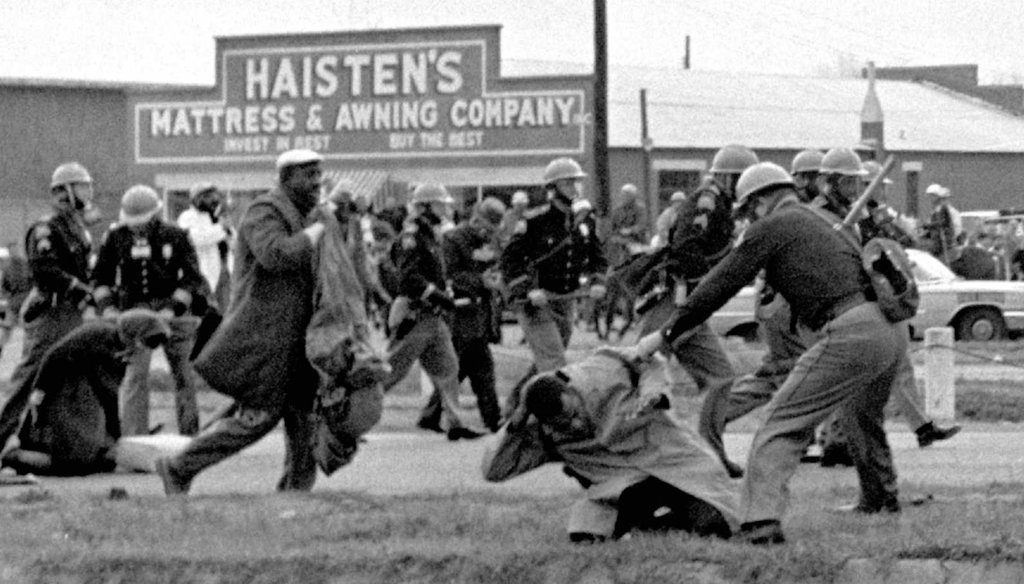Stand up for the facts!
Our only agenda is to publish the truth so you can be an informed participant in democracy.
We need your help.
I would like to contribute

On March 7, 1965, Alabama state troopers beat civil rights marchers in Selma, Ala. This month marks the 50th anniversary of a day that led to passage of the Voting Rights Act of 1965. (AP)
This week marks the 50th anniversary of President Lyndon Johnson’s signing of the Voting Rights Act.
In scenes memorialized in the movie Selma earlier this year, police on March 7, 1965, savagely beat hundreds of peaceful protesters as they set out to march for voting rights in Selma, Ala. "Bloody Sunday" became a turning point in the civil rights movement, speeding passage of the Voting Rights Act, which was crafted secure voting rights for all Americans. Johnson signed it on Aug. 6, 1965.
In 2013, the U.S. Supreme Court overturned a key provision of the Act involving federal pre-clearance of changes to state election law that could harm minority voters. This has led to a congressional push -- so far unsuccessful -- to strengthen the law.
Here’s a look at some of our fact-checks about voting rights:
Hillary Clinton on voting rights
In a speech on voting rights in June, Democratic presidential candidate Hillary Clinton made a series of attacks on GOP presidential candidates -- former Florida Gov. Jeb Bush, Wisconsin Gov. Scott Walker, former Texas Gov. Rick Perry and New Jersey Gov. Chris Christie.
She said when Bush was governor "state authorities conducted a deeply flawed purge of voters before the presidential election in 2000" and "a 2004 a plan to purge even more voters was headed off."
The 2000 effort started before Bush was in office, though it continued under his watch. In 2004, the state scrapped another purge after officials admitted errors. PolitiFact Florida rated her statement Mostly True.
She said Perry "signed a law that a federal court said was actually written with the purpose of discriminating against minority voters."
The law in question requires a photo ID from Texas voters and was greenlit by Perry in 2011. Federal judge Nelva Gonzales Ramos struck the law down in 2013. While that ruling was overturned by two higher courts, Ramos clearly described the law as discriminatory in her ruling. At the time of Clinton’s statement, the courts were still considering whether or not the law would be allowed to stand. We rated Clinton’s statement Mostly True. On Aug. 5, a federal appeals court ruled that the voter ID law violates the Voting Rights Act.
Clinton said that Walker "cut back early voting and signed legislation that would make it harder for college students to vote."
Legislation signed by Walker reduced the number of days allowed for early voting, but the blanket claim about college students overstates those changes. Some provisions could make it more difficult for certain college students to vote -- if, for example, they don't have a Wisconsin driver’s license, or moved to Wisconsin less than 28 days before an election. PolitiFact Wisconsin rated her statement Mostly True.
Walker responded with his own attack on Clinton, saying her "rejection of efforts to make it easier to vote and harder to cheat not only defies logic, but the will of the majority of Americans."
Walker was referring to photo ID laws, and polls show strong support for those laws, including from Democrats. The other elements of the claim -- that new laws would make it easier to vote and harder to cheat -- amount to a split. It’s clearly not easier to vote if voting requires the extra step of obtaining a photo ID. But it would be harder to cheat if there is an extra verification step at the polling place. PolitiFact Wisconsin rated Walker’s claim Mostly True.
Preclearance and the Voting Rights Act
Under the Voting Rights Act, several states and portions of states that had a history of discrimination, including certain counties in Florida, needed to get preclearance from the federal government before changing their voting laws. But that portion of the Voting Rights Act was challenged by Shelby County, Ala., and the U.S. Supreme Court sided with the plaintiffs in 2013.
A few days before the justices heard oral arguments in the case, U.S. Rep. John Lewis, D-Ga., argued in favor of keeping the provision. Lewis chaired the Student Nonviolent Coordinating Committee at the time of the Selma march and suffered a skull fracture.
He said that critics of the law "complain of state expense, yet their only cost is the paper, postage and manpower required to send copies of legislation to the federal government for reviews, hardly a punishment," Lewis wrote.
We found that for administrative reviews on minor issues, Lewis appeared to be correct. The Justice Department provided an administrative process for preclearance submissions that was designed to cut litigation costs. But states could also choose to take cases through the courts, which could be expensive. PolitiFact Georgia rated his claim Half True.
During oral arguments in the Shelby County case, Chief Justice John Roberts asked, "Do you know which state has the worst ratio of white voter turnout to African-American voter turnout? Massachusetts. Do you know what has the best, where African-American turnout actually exceeds white turnout? Mississippi."
The survey data Roberts likely used about Massachusetts is questionable due to wide margins of error, among other problems. However, he was correct that black voter turnout in Mississippi often exceeds white turnout. We rated his claim Half True.
In 2014, Attorney General Eric Holder warned Florida Republican Gov. Rick Scott that the federal government was monitoring voter access. But Scott’s campaign pointed the finger back at Holder.
"In fact, Attorney General Eric Holder’s own Justice Department precleared the voting changes in the 2011 law that governed the 2012 general election in Florida," Scott campaign manager Melissa Sellers wrote.
Scott’s statement omitted that the Justice Department only signed off on the state’s plan after it committed to offering the maximum hours for early voting in those counties. PolitiFact Florida rated Scott’s claim Half True.
Justice Department and voting rights cases
Finally, we looked at Obama’s claims about how aggressively the U.S. Justice Department investigated obstacles to voting. Obama said in a 2014 speech that the Justice Department had "taken on more than 100 voting rights cases since 2009."
Those 102 cases included instances not just when the department was the plaintiff, but also when it was the defendant or played some other role. So the Justice Department didn’t initiate the action in all of those cases. Because Obama was vague about what he meant by "taken on" cases we rated this claim Half True.
Our Sources
See individual fact-checks for additional sources
Austin American-Statesman, "Federal appeals court: Texas’ voter ID law violates Voting Rights Act," Aug. 5, 2015
































